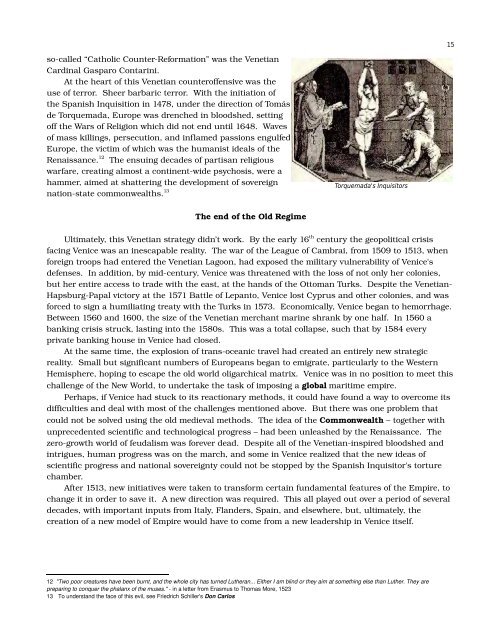Create successful ePaper yourself
Turn your PDF publications into a flip-book with our unique Google optimized e-Paper software.
15<br />
socalled “Catholic CounterReformation” was the Venetian<br />
Cardinal Gasparo Contarini.<br />
At the heart of this Venetian counteroffensive was the<br />
use of terror. Sheer barbaric terror. With the initiation of<br />
the Spanish Inquisition in 1478, under the direction of Tomás<br />
de Torquemada, Europe was drenched in bloodshed, setting<br />
off the Wars of Religion which did not end until 1648. Waves<br />
of mass killings, persecution, and inflamed passions engulfed<br />
Europe, the victim of which was the humanist ideals of the<br />
Renaissance. 12<br />
<strong>The</strong> ensuing decades of partisan religious<br />
warfare, creating almost a continentwide psychosis, were a<br />
hammer, aimed at shattering the development of sovereign<br />
nationstate commonwealths. 13<br />
Torquemada's Inquisitors<br />
<strong>The</strong> end of the Old Regime<br />
Ultimately, this Venetian strategy didn’t work. By the early 16 th century the geopolitical crisis<br />
facing Venice was an inescapable reality. <strong>The</strong> war of the League of Cambrai, from 1509 to 1513, when<br />
foreign troops had entered the Venetian Lagoon, had exposed the military vulnerability of Venice's<br />
defenses. In addition, by midcentury, Venice was threatened with the loss of not only her colonies,<br />
but her entire access to trade with the east, at the hands of the Ottoman Turks. Despite the Venetian<br />
HapsburgPapal victory at the 1571 Battle of Lepanto, Venice lost Cyprus and other colonies, and was<br />
forced to sign a humiliating treaty with the Turks in 1573. Economically, Venice began to hemorrhage.<br />
Between 1560 and 1600, the size of the Venetian merchant marine shrank by one half. In 1560 a<br />
banking crisis struck, lasting into the 1580s. This was a total collapse, such that by 1584 every<br />
private banking house in Venice had closed.<br />
At the same time, the explosion of transoceanic travel had created an entirely new strategic<br />
reality. Small but significant numbers of Europeans began to emigrate, particularly to the Western<br />
Hemisphere, hoping to escape the old world oligarchical matrix. Venice was in no position to meet this<br />
challenge of the New World, to undertake the task of imposing a global maritime empire.<br />
Perhaps, if Venice had stuck to its reactionary methods, it could have found a way to overcome its<br />
difficulties and deal with most of the challenges mentioned above. But there was one problem that<br />
could not be solved using the old medieval methods. <strong>The</strong> idea of the Commonwealth – together with<br />
unprecedented scientific and technological progress – had been unleashed by the Renaissance. <strong>The</strong><br />
zerogrowth world of feudalism was forever dead. Despite all of the Venetianinspired bloodshed and<br />
intrigues, human progress was on the march, and some in Venice realized that the new ideas of<br />
scientific progress and national sovereignty could not be stopped by the Spanish Inquisitor's torture<br />
chamber.<br />
After 1513, new initiatives were taken to transform certain fundamental features of the <strong>Empire</strong>, to<br />
change it in order to save it. A new direction was required. This all played out over a period of several<br />
decades, with important inputs from Italy, Flanders, Spain, and elsewhere, but, ultimately, the<br />
creation of a new model of <strong>Empire</strong> would have to come from a new leadership in Venice itself.<br />
12 "Two poor creatures have been burnt, and the whole city has turned Lutheran... Either I am blind or they aim at something else than Luther. <strong>The</strong>y are<br />
preparing to conquer the phalanx of the muses." - in a letter from Erasmus to Thomas More, 1523<br />
13 To understand the face of this evil, see Friedrich Schiller's Don Carlos

















